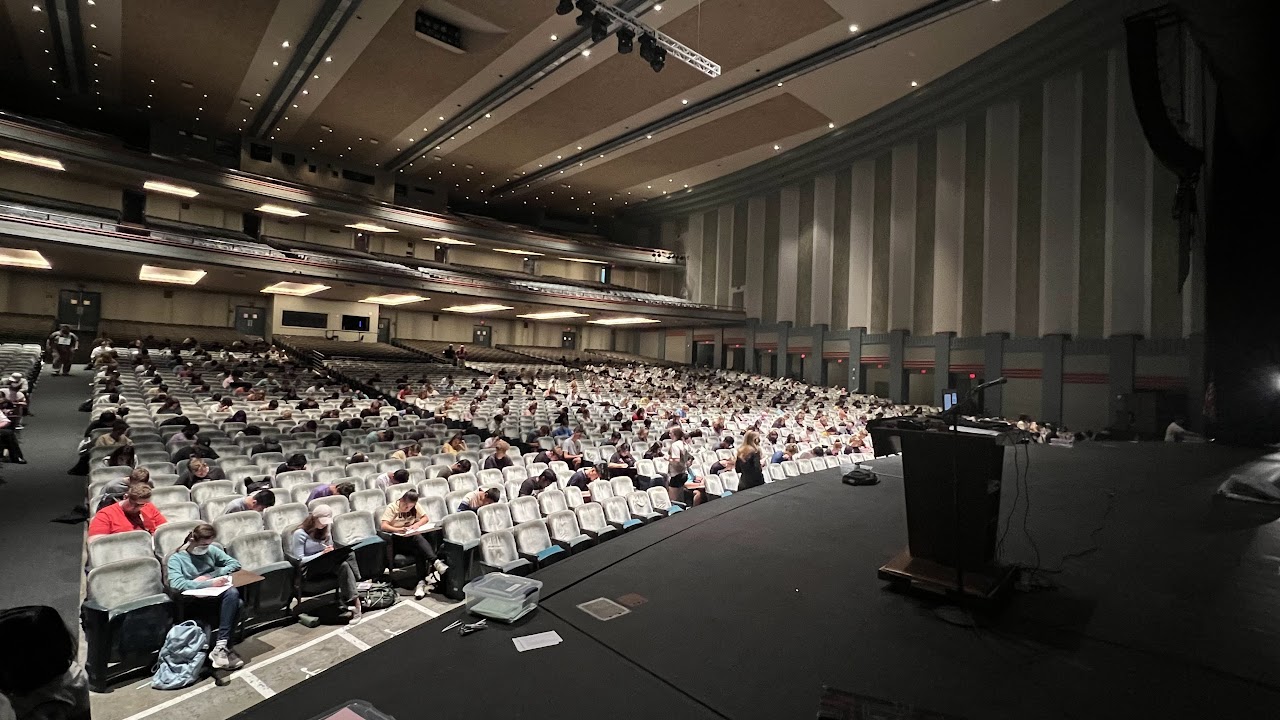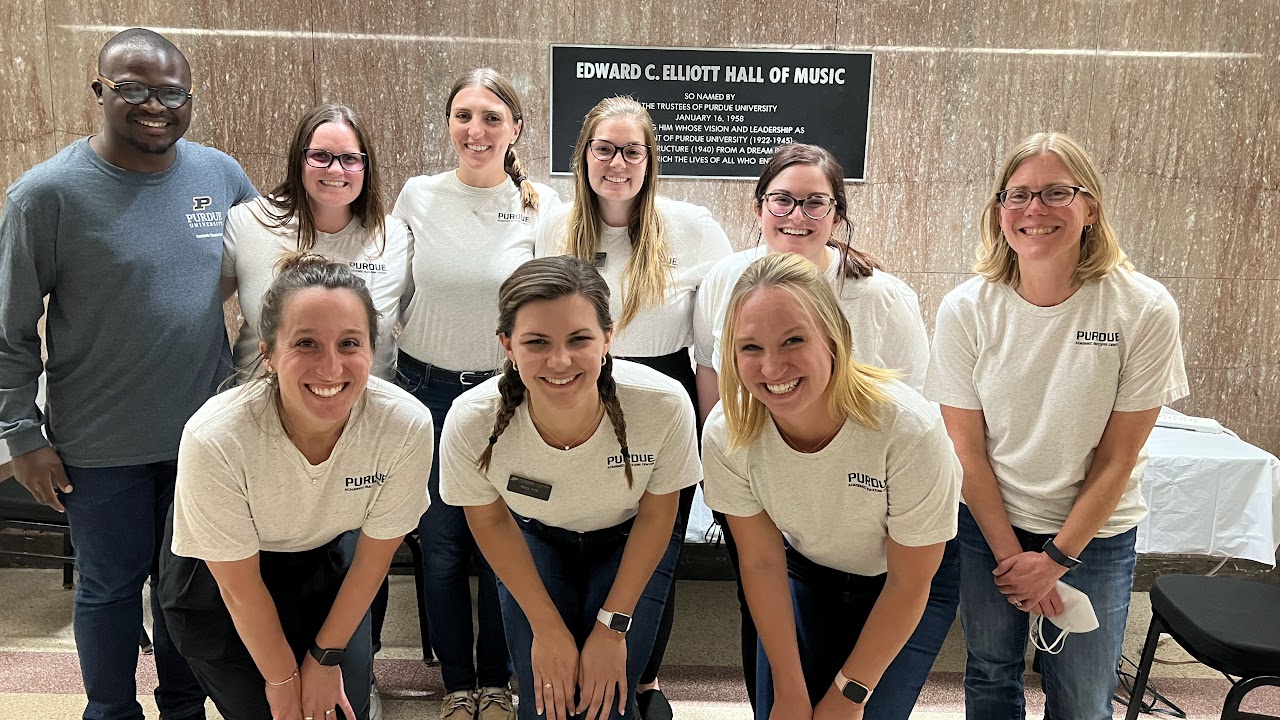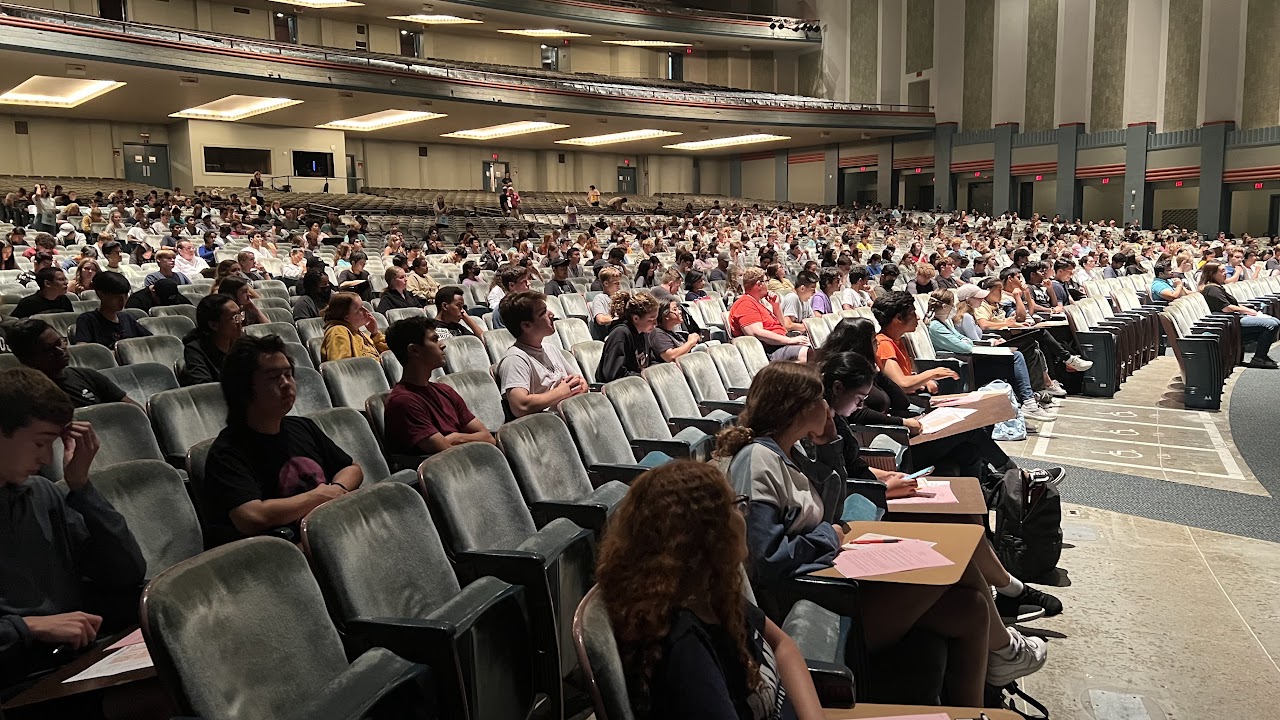For courses with large enrollment numbers, Elliott Hall of Music is Purdue’s most practical space for hundreds—and sometimes thousands—of students to take a single exam at once.
While great for concerts and commencement ceremonies, the venue provides some challenges as a testing environment. Its dim lighting and a cacophony of shuffling feet and papers can be distracting to students who have only tested in high school classrooms or virtual settings.
That’s why, after a brief pause due to the pandemic, Purdue’s Helen Bass Williams Academic Success Center (ASC) recently resumed its program that enables Purdue students to “test drive” the Elliott Hall exam experience.

Pictured: Over 500 students work on their mock exams during the Test Drive event in Elliott Hall of Music
The Test Drive event gives students—new freshmen in particular—an opportunity to take a timed, multiple choice practice exam in Elliott so they can experience the testing circumstances without any effect on their grade.
“Every semester, we hear from students that their first exams were much more difficult than the practice ones they took,” says Katie Dufault, ASC director. “The help students seek at the ASC is often reactionary, so we decided to simulate the exam experience to give new undergraduates a better idea of what to expect.”
More than 530 students participated in the Sept. 7 mock exam. The event focused on high-enrollment math, biology, and management courses.
Dufault said program coordinator Joanna Cardarelli made some educational updates to the event that students enjoyed.
"She saw the opportunity just before the exam started to provide a brief overview on some test-taking strategies and tips," Dufault said of Cardarelli, who oversaw this year's Test Drive event. "Then, after the event, her resource fair set-up was buzzing with students connecting to various academic resources available for free support."
Purdue’s Disability Resource Center (DRC), another unit in Student Success Programs, partners with the ASC during Test Drive so students with testing accommodations can take the mock exam in a distraction-reduced environment.
“Sometimes not knowing what to expect can trigger or exasperate anxiety,” says Kelsey Jordan, DRC assistant director and Testing Center manager. “By going through the Test Drive, our students now know what to expect for that first exam, which will hopefully help alleviate some of their anxiety for the real thing.”

Pictured: Professional staff from the Academic Success Center pose together during the Test Drive event
Terra Maienbrook, who teaches Management 200, said she liked the idea of the Elliott Test Drive from the start, especially because enrollment in her course ranges from first-semester freshmen to graduating seniors.
“Their experiences in taking an evening exam in Elliott vary significantly,” Maienbrook says. “For students who have some test anxiety, this is a great, no-stakes opportunity for them to see what their first exam is going to be like.” Maienbrook adds that the experience enables students to better manage situations on the actual exam day.
“I even had one student mention that it was obvious to him he should use his accommodations and take his exam at the DRC,” Maienbrook said. “I am glad this experience empowered him to make that decision prior to the first exam.”
In addition to experiencing the testing environment in Elliott, students also received graded feedback on their practice exam. Dufault, who has served as a proctor during past Test Drive events, says student often experience issues that might have negatively affected their results had they been taking a genuine exam.
“We had a lot more ‘learning moments’ this year, including that you can’t collaborate on exams even if it is just helping someone fill out their scantron,” Dufault said. “Some students forgot No. 2 pencils, while others forgot their Purdue student IDs, and several students shared that they are now planning to use their testing accommodations, or plan to reach out to the DRC. Those types of things may be inconsequential in a high school testing environment, but college is different.”

Pictured: Students look up from their seats to listen to instructions before starting their mock exams.
Another hope of the mock exam is that it will provide students a better measure of their proficiency with the subject matter.
“Some students struggle to accurately self-evaluate where they are with their study skills, knowledge, and course material,” Dufault says. “They come to Purdue with 12 years of experience that show them the way they study and learn is working, without realizing that the scenario and rigor has changed. And because this is a reality that students face, the ASC will continue to look for new ways to help students navigate the experience.”
Dufault says the ASC will continue to offer Test Drive annually, at the beginning of the fall term, with plans to adapt the event as new testing environments emerge.
Meanwhile, preparing students for large-scale exams will continue to be a priority for the ASC. As mentioned above, the ASC followed its Test Drive event with a resource fair on the main floor of Elliott, featuring representatives from the Women in Engineering and Women in Science programs, as well as Supplemental Instruction leaders and Peer Success Coaches from the ASC. The event also featured information on College of Science Instructional Nightly Enrichment (COSINE), and other general support.
“Part of the goal is to help students see where they are at with the testing environment in terms of content knowledge, help trigger the realization that they could use more support, and then immediately provide an opportunity to seek that help in a positive, casual environment,” Dufault says.
The ASC has already scheduled a variety of workshops that will help students prepare for final exams, improve time management, polish their study skills, and avoid procrastination. A full list of workshop opportunities is available on the ASC website; staff and faculty are encouraged to promote these free offerings to students who may be interested. Although advance registration is preferred, students may also register at the event.

Andrea Mattingly
Director of Communications for Student Success Programs, andrea@purdue.edu

